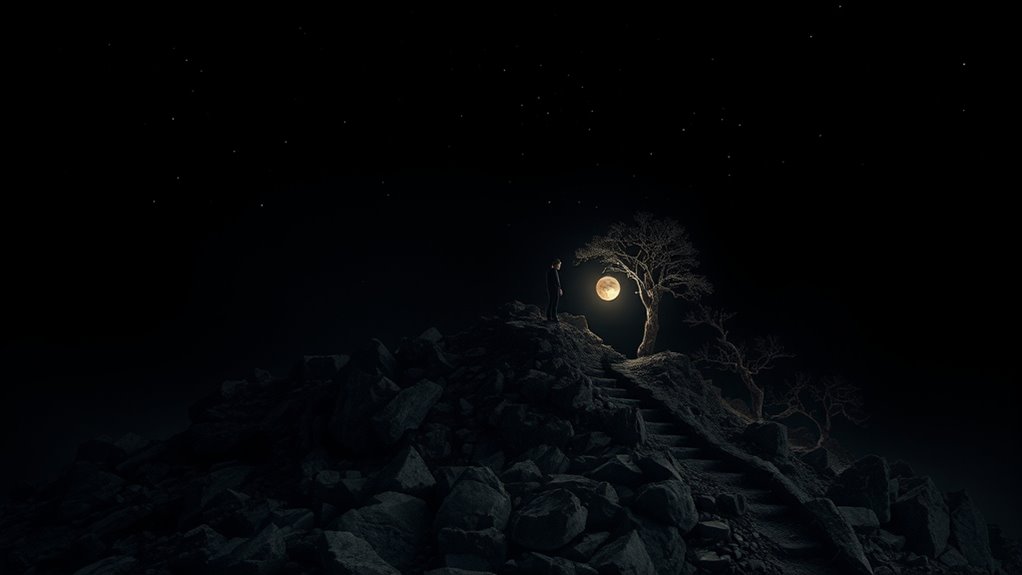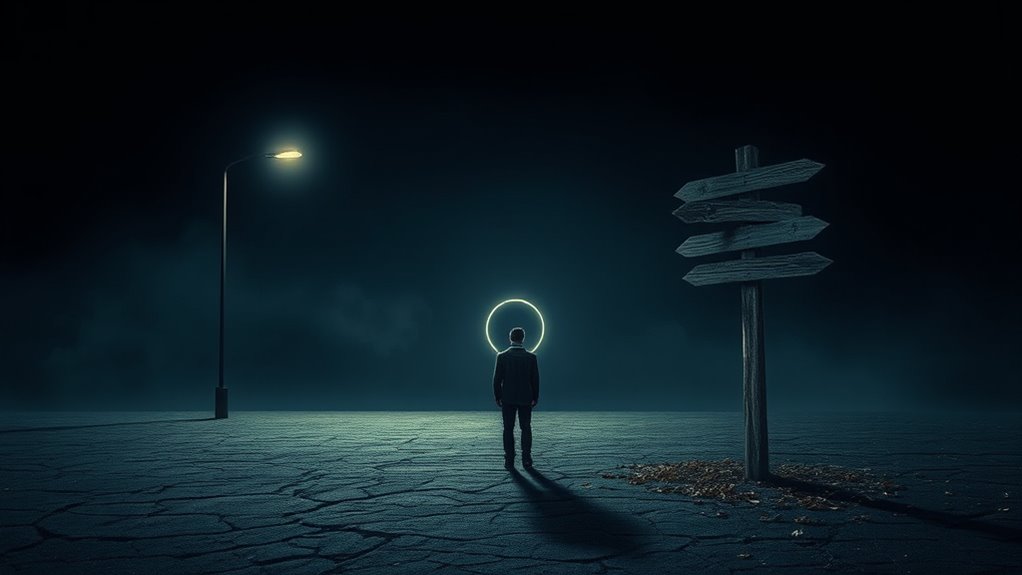During the dark night of the soul, you may notice signs like feelings of loss, mood swings, or questioning your beliefs. It’s a time of inner struggle that tests your emotional resilience but also signals a shift toward spiritual awakening. Support from trusted friends, mindfulness practices, and patience can help you navigate the chaos. As you progress, you’ll experience deeper self-awareness and inner peace—continuing your journey reveals even more about this transformative process.
Key Takeaways
- Signs include feelings of emptiness, loss of old beliefs, and mood swings indicating a desire for higher truths.
- Recognize that emotional upheaval and confusion are temporary signs of spiritual growth and transformation.
- Practice mindfulness, meditation, journaling, and self-care to maintain emotional resilience and stay grounded.
- Seek support from trusted friends, mentors, or spiritual communities to navigate challenges with guidance.
- Embrace the experience with curiosity and self-compassion, trusting it leads to deeper self-awareness and inner peace.

The Dark Night of the Soul is a profound spiritual experience marked by intense inner struggle and questioning. During this time, you may feel overwhelmed by feelings of confusion, despair, or disconnection, as if your inner world is unraveling. It’s a period where your emotional resilience is tested, demanding you to confront deep-seated fears and doubts. Though challenging, this phase often serves as a catalyst for a spiritual awakening, opening your eyes to new perspectives and a deeper understanding of yourself and your purpose. Recognizing that this experience is a natural part of spiritual growth can help you navigate it with greater patience and compassion for yourself.
As you go through the dark night, expect to encounter signs that your soul is yearning for transformation. You might experience a sense of emptiness or loss, feeling as if everything you once knew no longer holds meaning. These signposts are not indicators of failure but rather signals that you’re shedding old beliefs and attachments, making space for higher truths to emerge. You may notice sudden shifts in your mood or a persistent feeling of being lost, but these are often fleeting. Stay grounded in the understanding that emotional resilience is *essential* here; it’s what will help you endure the storm and emerge stronger on the other side. The process of spiritual awakening often involves stripping away illusions, revealing your authentic self and aligning you with a greater purpose. Interestingly, exploring anime movies and animated films that touch hearts can offer comfort and insight during this transformative journey.
During this journey, support becomes *indispensable*. Seek out guidance from trusted friends, spiritual mentors, or communities that resonate with your path. They can offer reassurance, share insights, and remind you that you’re not alone. Practice self-care and mindfulness to nurture your emotional resilience—simple acts like meditation, journaling, or breathing exercises can help stabilize your mind and emotions. Remember, the dark night isn’t forever; it’s a temporary phase that pushes you toward growth and enlightenment. Embrace it with curiosity rather than fear, knowing that each moment of struggle carries the seed of a profound spiritual awakening. Trust that, with patience and support, you’ll emerge from this experience with a deeper connection to your true self, ready to step into a new chapter of spiritual clarity and inner peace.
Frequently Asked Questions
How Long Does the Dark Night of the Soul Typically Last?
The duration timeline of the dark night of the soul varies for each person, often lasting from a few weeks to several months. During this healing process, you might feel intense emotional upheaval and deep introspection. Remember, it’s a natural part of growth, and patience is key. Focus on self-compassion and trust that this period will pass, leading to greater clarity and inner peace as you emerge stronger.
Can the Dark Night of the Soul Be Avoided?
Like trying to steer clear of stormy seas, you can’t completely prevent the dark night of the soul. But, with spiritual readiness and preventive measures—such as cultivating mindfulness, maintaining a strong connection to your inner self, and embracing vulnerability—you can navigate its waters more smoothly. It’s a natural part of growth, teaching resilience. Instead of avoiding it, prepare yourself, so when it comes, you face it with courage and clarity.
What Are Common Misconceptions About This Spiritual Experience?
Many people believe misconceptions or myths about the dark night of the soul, thinking it’s a sign of failure or punishment. In reality, it’s a natural part of spiritual growth, often misunderstood as spiritual misunderstandings. You might see it as a negative experience, but it’s actually a profound opportunity for transformation. Recognizing these misconceptions helps you embrace the journey, understanding that this phase is essential for deeper self-awareness and spiritual awakening.
How Can I Differentiate Between Depression and the Dark Night?
Imagine you’re living in 3024, and you’re trying to tell the difference between depression and the dark night. You notice emotional symptoms like persistent sadness and fatigue, but spiritual indicators include a sense of deep questioning or transformation. Depression often feels like a relentless fog, while the dark night may bring discomfort but also a potential for spiritual growth. Recognizing these signs helps you navigate your journey more clearly.
Are There Specific Practices That Can Ease This Spiritual Crisis?
You can ease this spiritual crisis by practicing meditation techniques that focus on breath and present-moment awareness, helping you find calm amidst chaos. Grounding exercises, like feeling your feet on the ground or holding onto a comforting object, anchor you in reality. These practices support emotional stability, reduce anxiety, and foster inner peace, making it easier to navigate the challenges of this intense inner journey.
Conclusion
Ironically, the dark night of the soul isn’t the end but a strange beginning. While it feels like you’re lost in shadow, it’s actually leading you to profound growth and clarity. Embrace the discomfort—because in the depths of darkness, you’re often discovering your brightest self. So, trust the journey, even when it feels endless. After all, it’s in the darkness that you find the light you never knew was there all along.









